Your story starts far from the world of wine – on a sugar cane farm in KwaZulu-Natal, a coastal town far from the Cape wine regions, in a non-wine-drinking household. Can you tell us how you first found your way into wine?
In 2004, during my matric year (aged 18), I received a bursary that allowed me to study any subject in agriculture. At a career expo, I vividly remember seeing students from Stellenbosch crushing grapes with their feet, and I was immediately captivated. Despite my family's unfamiliarity with wine due to our Christian upbringing in KwaZulu Natal, Empangeni ,a farming and sugar cane-growing area in the North East, I developed a deep passion for the wine industry and its culture, especially the craft of winemaking.
My love for chemistry also played a significant role; if I hadn't become a winemaker, I likely would have pursued a career in chemical engineering.
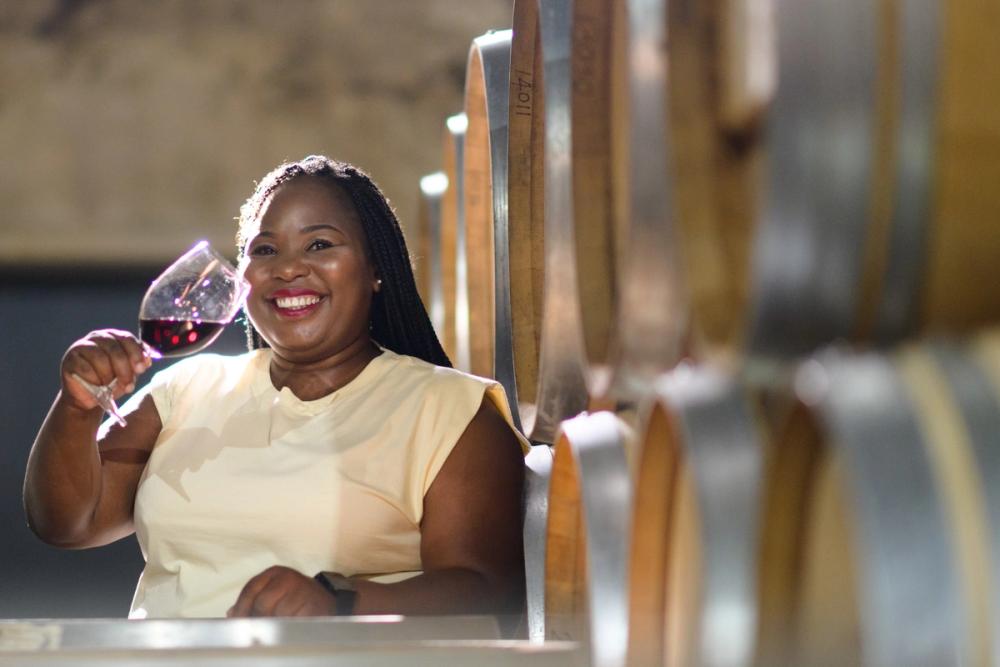
Praisy Dlamini is proud of what she has been able to achieve as a winemaker but also how Amandla can inspire others from traditionally non wine backgrounds to make a career in the industry
My winemaking journey has truly enriched me, both professionally and personally. Being a winemaker offers a unique opportunity to craft a masterpiece encapsulated in a beautiful bottle of wine. This creation becomes a pathway to connecting with others and broadening horizons.
Winemaking isn't glamorous; it's a journey fraught with challenges, such as unpredictable weather and economic fluctuations that are often beyond our control. However, witnessing the final product in all its glory is immensely rewarding.
What was your initial breakthrough and opportunity in wine?
Being selected for The Cape Winemakers Guild Protégé Programme. The programme plays such an important role in laying foundations and acting as a springboard for the next generation of winemakers - cultivating and nurturing talent and seamlessly connecting young protégés with the pulse of South Africa’s wine industry.
You were the first black woman to be selected for the programme - what did that experience mean to you?
It was such a huge moment for me. Being the first black woman chosen for the Protégé Programme felt surreal at first - but also empowering. It was a transformative experience.Training under some of the most respected figures in the industry not only sharpened my technical skills but also expanded my perspective on what is possible in this field.
It wasn’t just about winemaking; it was about finding my place in a space where people who looked like me hadn’t really been seen before. It gave me confidence, a sense of belonging, and a real drive to help create space for others too.
It meant breaking barriers, but more importantly, it meant opening doors for others to follow. I carry that journey with pride and purpose.
What do you think you learnt most that you have taken into your winemaking career?
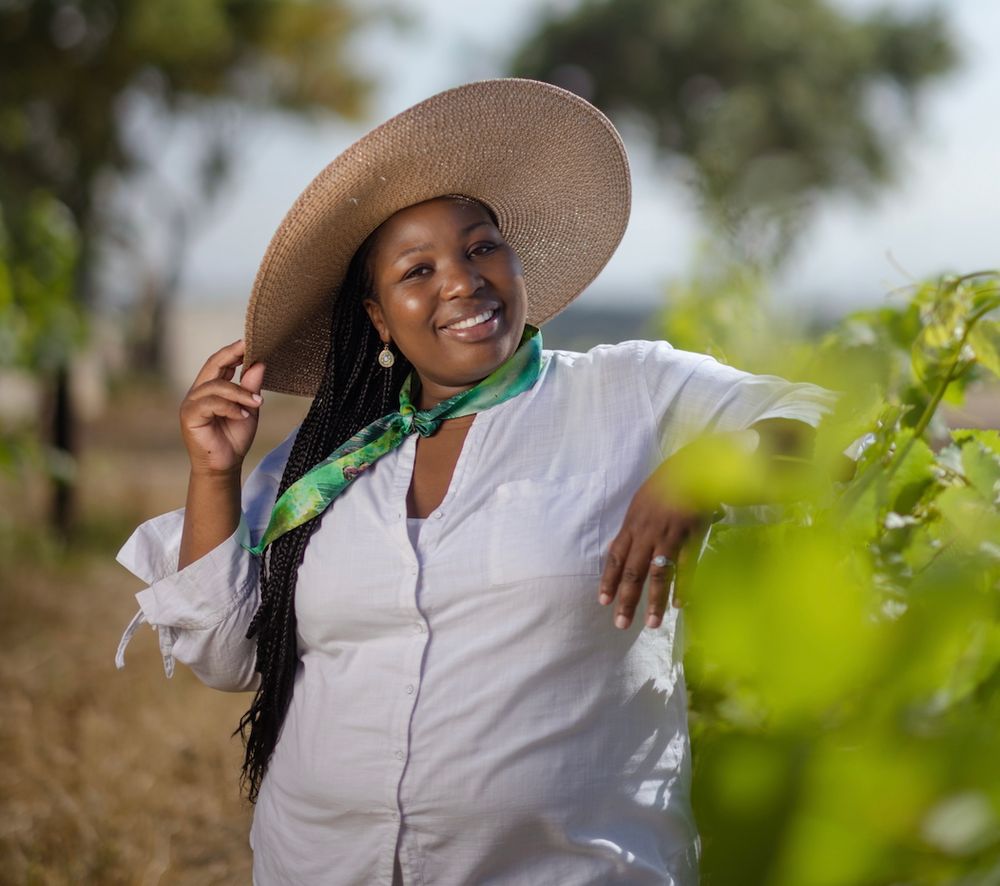
Praisy Dlamini was the black woman to be chosen for the Cape Winemakers Guild Protégé Programme.
The biggest thing I took with me is the value of patience and attention to detail. Winemaking isn’t just about following a recipe. It’s about knowing and understanding your vineyard, understanding the process, and knowing when to step in and when to let nature do its thing.
I also learnt that mentorship and collaboration are just as important as skill. The support I received from my mentors showed me the kind of winemaker and leader I can be.
What was it like to work with the likes of Philip Costandius, David Finlayson and Pieter Ferreira? What did you learn the most from them?
Working with Philip Costandius, David Finlayson, and Pieter Ferreira wasa masterclass in winemaking and in leadership. Each of them brought something unique to the table.
With Philip, I learned to trust my instincts and think creatively. He was open to share his personal experience as winemaker and how respect for peers is important.
David really honed my technical skills. He was meticulous, and I remember spending hours with him tasting barrel samples, learning how the smallest tweaks could change everything. That discipline stayed with me.
And then there’s Pieter - his passion for bubbles is absolutely infectious. He showed me how winemaking is a balance of science and soul, especially when you’re waiting years to see the result of your effort.
More than just skills, they each taught me the value of mentorship, generosity, and believing in the next generation. I carry those lessons with me every day.
Today, you lead Amandla a progressive, all-female, majority black-owned brand under Adama Wines. How did the brand come about?
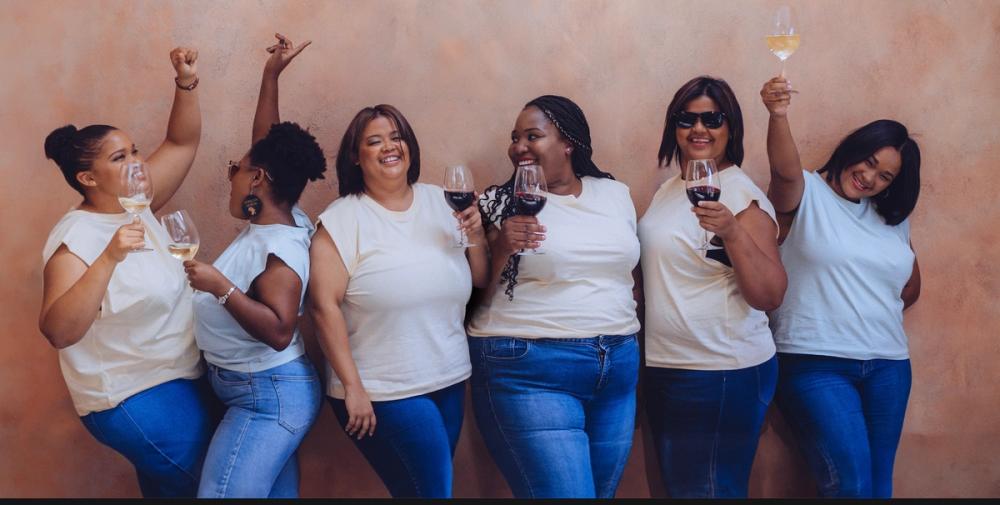
Adama Wines is an all black female run winery in South Africa that is turning over R50 million a year
Amandla was born out of a shared vision - to create a wine brand that not only makes great wine, but also represents strength, identity, inclusivity, and empowerment for women. The name itself means 'power', and that’s exactly what we wanted to embody: the power of women, the power of collaboration, and the power of owning our stories in an industry that hasn’t always seen us.
It came together through Adama Wines, which has long been committed to transformation in the South African wine industry. As women working in different parts of the business, we realised we had something unique that we can offer; diverse experiences, a passion for wine, and a drive to challenge the status quo.
The business now produces approximately 4.7 million litres of wine annually across our operations and turns over R50m plus a year. We own vineyards across the cape incuding: 22 hectares at Klipdriftskraal farm in Hermon, just beyond Wellington; 75 ha in Porteville, Nu Hoop; and have long-term contract at 80 ha in Worcester and 65 ha yearly contracts.
Amandla is our way of pouring all of that into every bottle. It’s more than just a label - it’s a movement. It represents a dream realised. It’s a symbol of resilience, ownership, and possibility - not just for myself, but for every young woman, especially women of colour, who’s ever wondered if there’s space for her in the wine world. It’s about taking up space boldly and unapologetically.
For the wider industry, I hope Amandla serves as a signal of change. It challenges narratives and opens conversations about inclusion, representation, and access. It shows that excellence doesn’t come from one mould. That talent, passion, and leadership is inclusive - that there’s incredible strength in doing things differently, together.
You describe Amandla as a brand that “pays it forward” – how does the bursary scheme and mentorship programme work, and why is it central to the business model?
When we say Amandla 'pays it forward,' we mean it in every sense. From the beginning, we knew the brand couldn’t just be about us; it had to create real opportunities for others too. That’s why the bursary scheme and mentorship programme are built into the core of our business model, not just as add-ons.
A portion of the profits (2% of sales profit) from every bottle sold goes directly into funding bursaries for young people to pursue their tertiary studies. We also offer them mentors from within our network - individuals who have walked the path, faced the challenges, and can offer guidance that goes beyond the classroom.
It’s central to Amandla because we’re not just trying to grow a brand- we’re trying to grow a community. If we want lasting transformation in the wine industry, we must invest in it from the ground up. And that means making sure the next generation is supported, seen, and set up to succeed.
Tell us about the wines in the Amandla range – what styles are you aiming for?
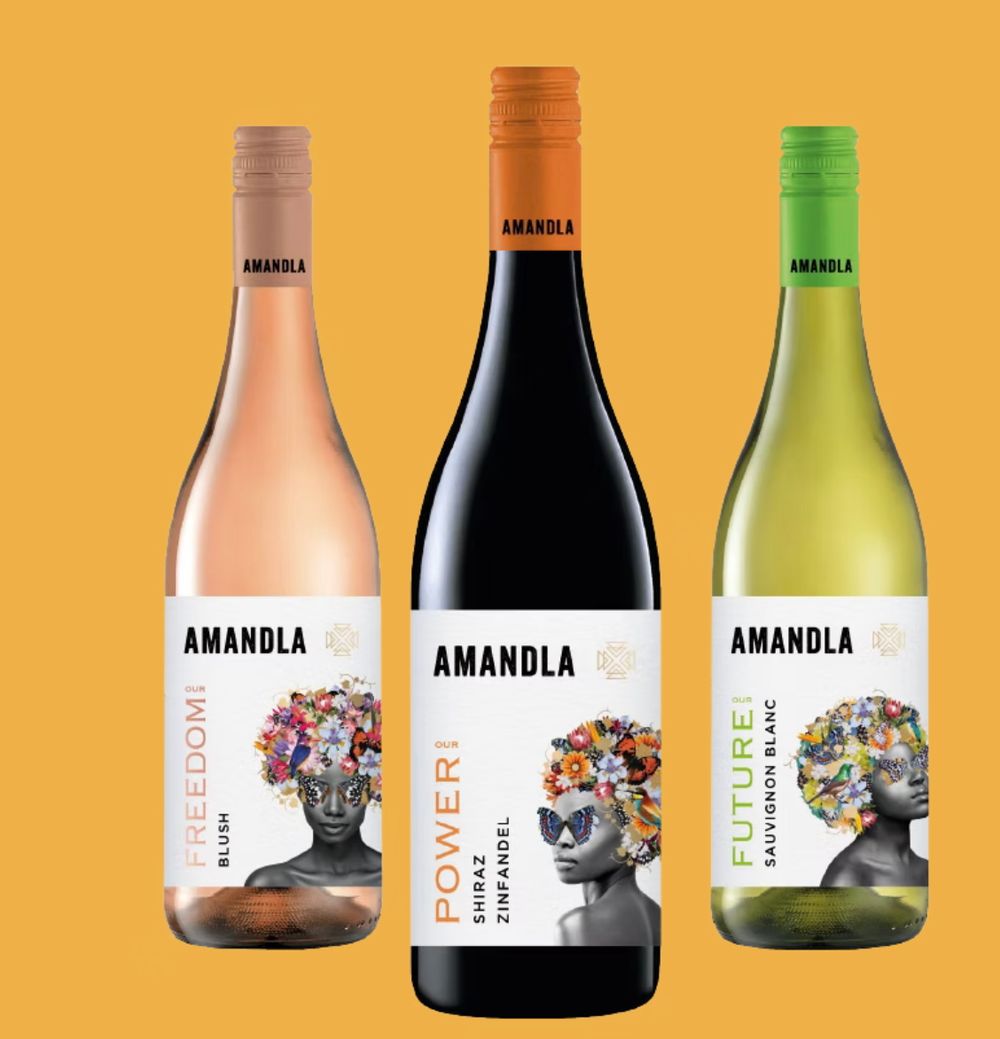
The Amandla wine range with its distinctive label
The wines in the Amandla range are crafted to reflect both our roots and our boldness. Each bottle tells a story - not just of terroir, but of identity, intention, and collaboration. We’re aiming for wines that are vibrant, expressive, and accessible, but still carry depth and character.
Right now, we have a fresh, fruit-forward Sauvignon Blanc that’s beautifully balanced. It carries the true essence of South Africa’s winemaking style, but with a modern, youthful energy. Our red is a Shiraz-based blend with Zinfandel: smooth and structured, with vibrant plum and blackberry notes, juicy on the palate and lifted by gentle spice. It’s the kind of wine that invites conversation and lingers in the memory.
We also have Amandla Chenin Blanc, Pinotage Malbec and our Blush Rosé available for the on-trade through Matthew Clark.
We’re not here to chase trends - we want to make wines that are honest, proudly South African, and full of personality. Wines that feel good to drink and bring people together - whether you know a little about wine or a lot.
What are your main export markets?
The UK and the US. We are just back from a really successful tour in the US with our importer Lionstone International. I’ll be over in the UK on tour with Matthew Clark in the autumn.
How do you see them fitting in to UK wine lists?
The wines offer great quality for the price and Amandla is perfect for wine by the glass. I think they are so well suited for casual dining settings and mid-range restaurants that want something fresh, vibrant and a little bit different.
For independent wine shops, I think Amandla can bring something customers are really looking for - wines with a clear identity and a genuine story behind them. We are an authentic company, majority black-owned and 100% black female-led. We are rooted in heritage, fuelled by purpose and we represent voices that aren’t often seen on the shelf.
What message would you give to UK sommeliers and wine buyers who want to offer something fresh and relevant to younger, more diverse customers?
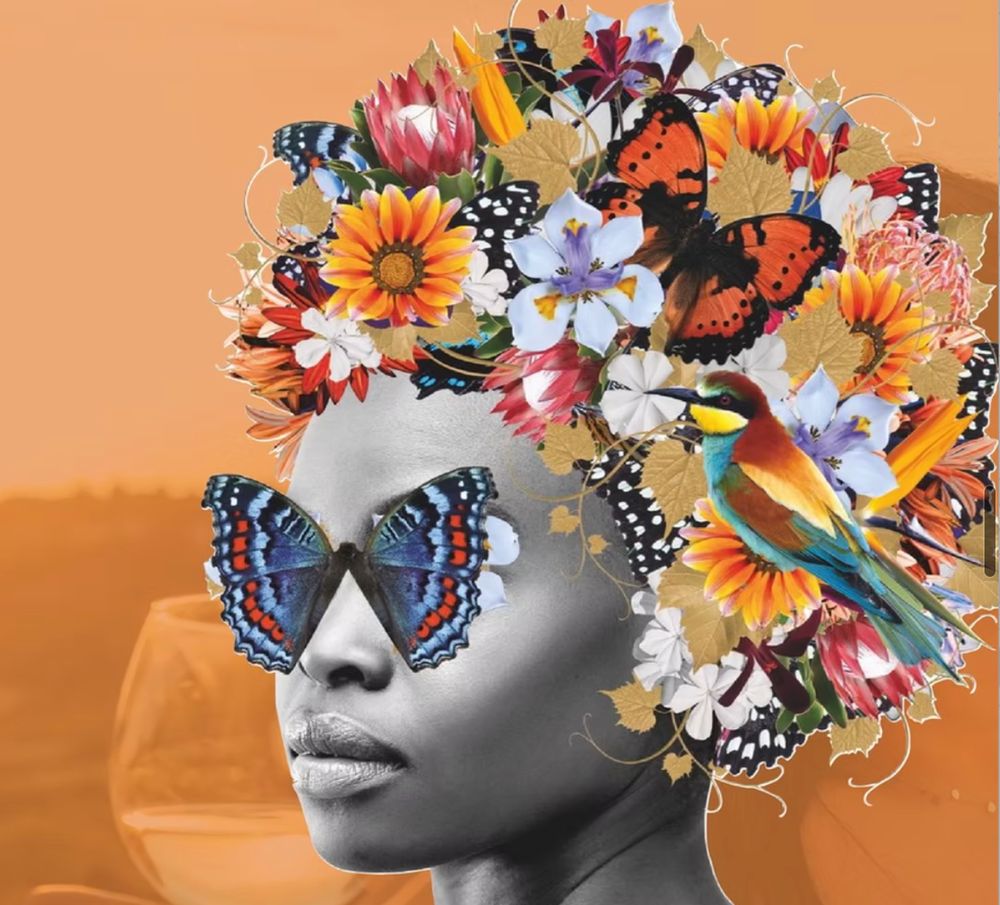
Amandla demands to be taken noticce of with its distinctive and stand out design
Amandla is more than a wine - it’s a statement. Crafted by one of South Africa’s leading black female winemakers, the wines deliver expressive fruit flavour, a juicy, rich palate and the true resonance of South African wines. The wines are perfectly placed for by-the-glass menus, offering great value and a story that speaks to a new generation of wine drinkers - those who care about what’s in the bottle and the people behind it.
If you’re curating a list that reflects the world your customers live in- diverse, conscious, and curious - Amandla belongs on it.
We talk a lot about diversity, equity, inclusion in the wine industry, but how much of that talk translates into action in wine buying?
Done well, DEI becomes more than a policy, more than just ticking boxes. It sparks a collaborative movement that involves producers, retailers, and communities alike helping to reshape wine culture into something more representative, accessible, and engaging for everyone.
There’s been a lot of positive conversation, but real progress comes through action. When implemented thoughtfully, DEI isn’t just about who works in the industry, it’s also about what ends up on the shelf and who feels represented.
For me, it’s about representation with meaning. Brands like Amandla bring personal stories, cultural heritage, and new perspectives to the table. When those stories are reflected on wine shelves and lists, it creates a deeper connection - especially with younger, more diverse consumers who want to see themselves in the products they buy.
How can trade buyers genuinely help make a difference?
It’s the buyers who have the real power to make the change. Choosing to support producers from underrepresented backgrounds makes a direct difference, especially when those wines are given proper visibility and a fair chance to succeed.
It starts with conscious buying: look beyond the usual names, ask questions, and be open to new stories and styles. It’s also about long-term support - mentoring, collaboration, and building relationships that go beyond a one-off listing.
It doesn’t need to be complicated, but it does need commitment. When buyers lead with intention, the whole industry can start to shift and we can all benefit from a more inclusive and exciting wine culture.
The Amandla team is all-female, from vineyard and cellar to export. How important is that visibility in terms of inspiring the next generation of women in wine?
Amandla adds diversity of culture, leadership, and voice to the wine world. At
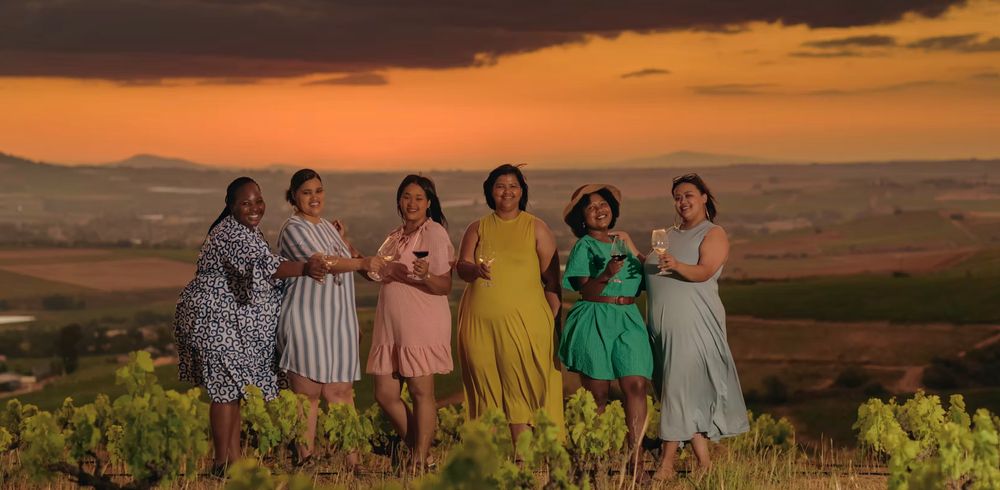
The all female team at Adama and Amandla wines come from a wide range of backgrounds but have all come together to make their mark on the wine industry
Amandla, we are all women, and we come from many different backgrounds. Some of us grew up in rural areas or farming families, others didn’t even know what winemaking was until they joined. Most never imagined they’d be working in wine, especially not in roles that are this exciting, dynamic and full of purpose.
That visibility matters - not just for women, but for challenging the idea of what leadership in wine looks like.The all-female Amandla team is more than a success story - it’s a blueprint for change. This visibility inspires confidence, shifts perceptions, and shows the next generation that gender doesn’t define ability, ambition, or excellence in wine.
How important is it for you that Amandla becomes more than just a ‘South African story’?
It’s very important. While its roots in South Africa are vital to its identity, the message and mission behind Amandla are universal.This is a story about women in leadership, about breaking industry norms, and about creating space for authentic voices in the global wine narrative. By positioning Amandla solely as a regional curiosity, we risk limiting its impact - when in reality, it speaks to global themes like equity, visibility, cultural pride, and community-driven business.
For Amandla to grow and inspire at scale, it should be seen as a model - not just of what’s happening in South Africa, but of what’s possible everywhere when underrepresented voices are empowered.
The story may begin in South Africa - but its relevance and its potential to influence - goes far beyond borders.
What advice would you give to your younger self just starting out?
Trust your instincts and start before you feel ready. Your voice, your vision, and your story matter more than you know. The wine world can be slow to change, but don’t let that stop you from showing up fully and authentically. Ask questions, learn constantly, and lean into what makes you different - that’s your strength, not your weakness.
Be patient with the process, as like wine, growth takes time. Build with purpose, not perfection. Surround yourself with people who share your values and aren’t afraid to challenge the norm. And when it feels hard, remember: you’re not just creating something for yourself, you’re opening the door wider for those coming after you.
Be bold. Be kind. And never forget - you belong in every room you enter.
What have been your proudest achievements?
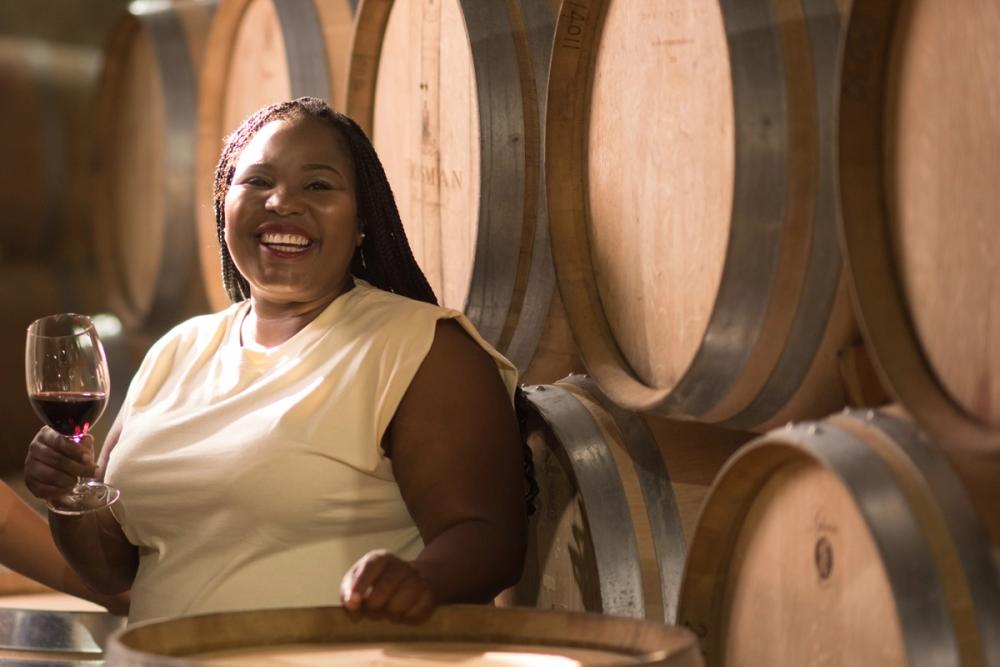
Praisy Dlamini says the challenges she has faced in her career has also "fuelled my commitment to create spaces where everyone feels they belong and can thrive".
Our bursary fund has been a powerful force for change - seeing the lives of young people transform because we helped open doors is truly the most rewarding experience. Winning the Growing Inclusivity Award in February was an amazing recognition of that impact and motivates us to keep pushing forward.
What have you found to be most challenging in your career?
One of the most challenging aspects of my career has been breaking through long-standing industry norms and biases, (access to capital – to support projects and initiatives that will fuel change; access to affordable land and water to secure supply chain). It takes resilience to keep pushing for change and inclusion when progress can feel slow.
Balancing the passion for what I do with the realities of systemic barriers has taught me patience and perseverance. But those challenges have also fuelled my commitment to create spaces where everyone feels they belong and can thrive.
What advice would you give to young people today who might not see themselves represented in wine?
The wine world is slowly changing, and your voice, your perspective, and your background are part of what will shape its future. Start where you are. Stay curious. Ask questions. Find mentors or communities that reflect your values, even if they’re small. And most importantly, know that you don’t have to change who you are to fit in. The industry needs your difference, not your conformity.
There’s space for you in this world - whether in the vineyard, the cellar, the boardroom, or beyond. Representation may still be catching up, but you can be the reason someone else sees a place for themselves too.
- To find out more about Amandla go to its website here.






























